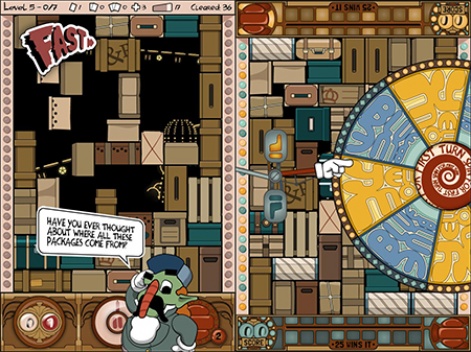Running a business as an independent game developer is a pretty personal process. It's often very difficult to dissociate your desire for an idea to succeed from a rational analysis of whether it actually will.
I recently came to a decision that, rationally speaking, it would be foolhardy to continue to pursue independent game development as a stand-alone commercial prospect.
I am still making games independently, but I am no longer doing so in a way that holds the sustainability of that endeavour up as a predominant aim. The question is, why?
Becoming a banker
There's a little thought tool I use when coming up with a business idea.
I imagine I am a bank manager and someone is coming to me with this idea looking for a loan to fund it. It is my job to make sure that the bank doesn't lose money on its investments.
I am indifferent to the plight of the individual in front of me and I have a day filled with other loan decisions, mostly safe prospects granting capital for equipment to already established businesses; lending start-up capital for a catering company might be about as risky as it gets.
The question is whether I would countenance the notion of lending money to fund this idea in front of me.
Since starting to do this, whenever I have put the idea of independently making and selling mobile games in front of myself-as-bank-manager, I find myself suggesting to the imaginary unfortunate in front of me that I could better invest my money by putting it all on Lucky Lad in the 3:20 at Chepstow.
There are some notable exceptions, of course. A mobile version of a recent and very popular game from another platform, for instance, given the right arrangements, is about as close to a surefire yes as you are likely to get.
However, the point is that if my bank manager self isn't willing to consider the plan as a commercial prospect, then neither should I.
Meddling with myths
It's a simple tool, but when I apply it I start to unravel some of the most common fantasies that mobile indie developers use to drive their work.
Applying a clever monetisation model looks risky; even if it's tried and tested, the niche it's exploiting may well be saturated around the time you get there.
Spreading the bet by making more, smaller games using these tried and tested techniques is a sensible option, but it's still not enough to convince me that on average they will perform well enough to match the risk-reward balance of the catering start-up I just saw or the carpenter I've got coming in next.

Lister's first iOS release Imp Paired
I have met a lot of mobile indie developers who spend their working days turning out commercial games that aren't even, by the bank manager test, that commercial.
Some of them have always been chasing the big payout - looking at the likes of Angry Birds, for instance, and thinking they wanted a slice of that.
Some of them started out just wanting to make games, discovered they weren't making money so jumped on to more and more commercial strategies to keep themselves going until they get to a point where they're only making games that are commercial strategies.
Now that's fine. Those people may all be happy with what they're doing. They may well have managed to make some money, even if continuing market saturation has meant that the days of the big payout are fading and that their commercial strategies are becoming less and less effective. But the thought of going down that route scares the hell out of me.
It seems to me that the landscape of games is huge and beautiful and full of wonderful things and that the games industry's commercial mines excavate, at a very great pace, a relatively narrow vein that runs down the middle.
That's not to say that prospectors don't find success elsewhere. They do. They discover rich mineral deposits in unlikely places. Some people have a better knack for finding them out than others and a serious find usually attracts a gold rush.
However, I got into making games to explore the huge and beautiful landscape, so scraping a living working in the commercial mines seems like a pretty dismal prospect to me. I think I would rather have a ranch that generates enough yield to allow me, every once in a while, to go on an exploratory expedition into the wilderness.
Getting real
What I am trying to say via what's admittedly and over elaborate metaphor is that, in the general case, reconciling running a mobile game development business with the desire to make independently minded games is untenable, and if I have to choose one I am going to choose to be independently minded.
So where does that leave me? It leaves me with an independent game development habit that is almost certainly going to lose money.
Supporting this loss requires a commercial venture, and by that I mean an actual commercial venture that my bank manager would certainly entertain.
It could be any realistic prospect. In my case it is been founding Playhouse, a company that designs and implements physical and digital games for use within other organisations, helping them address intra-organisational issues in a playful and humane way.
That business draws on the skills I have developed as a game developer, as well as those from my architectural background. As a bonus, it continues to inform my thinking about games, but more importantly than that, running this enterprise allows me to make games outside of that core business.
Games that are allowed to lose money. Games that are allowed, in fact, to recoup not a single penny.
It allows me to make those games not because they will ship copies, but because they are interesting games to make.
Having this split in a studio between making games for clients and making games for yourself is far from unusual, but I think the tone in which I'm doing it here represents a small part of a shift in thinking that I see reflected among other independent developers.
When I first entered the games industry the dominant message was that studios were running a commercial arm until the games division could take over. Here, though, there's a will to run a commercial arm so that the games division doesn't have to take over.




















